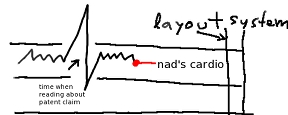
Sometimes it happens that someone says to you something occasionally – like as a side remark, but that that phrase – despite its parenthetical nature – sticks in your head. Something similar to this happened to me when an intern at a german company where I was also as a student intern said to me: Nadja – one should buy shares only with gratuitous money, never with money that one needs. Maybe this phrase stuck in my head because this person was one of the very few persons in my surroundings which knew something about the stock market, who knows. However bank accountants and other financial consultants kept telling me to care for my retirement by investing in all sorts of bonds. In view of this discrepancy of recommendations and out of curiosity I thus took part in an online game which was organized by a german public TV station (If I remember correctly WISO, ZDF).
In this game one started with a fixed virtual start amount of money which could be virtually invested in real stocks at real prices. Despite that this “stock market” was only a game it nevertheless became quite captivating. I learned a lot in this game, like that it is rather difficult to have high returns on short term investments a.s.o At the end the game became quite time consuming though. But as a result I decided to follow the advice of the person from the internship which was sound. I never owned a bond.
But this little adventure in financial markets taught me more. It made me clear that the feature of “surplus” or “gratuitous money” is quite essential. Or in other words the often proclaimed view that financial markets are democratic and open to everybody seems to be more informed by concrete interests (like to sell financial packages to laypersons) than by actual facts.
Further deduction allows to say in a simplified manner that there are the following ways to become rich (we leave marriage and adoption out): that is either by being able to “sell” highly demanded goods (like done by hollywood actors, exceptional artists, rags to riches etc.) or via owning a surplus and letting the “money work” with high returns and/or a combination of the two. Lotto wins etc. are the exception to this rule. Lets consider criminal activities also as an exception.
It is interesting to observe that the first kind, i.e. the “self-made” riches are rather accepted while the latter the “undeserved”, “lazy” riches are seen more critically. This holds especially true for the recent protagonists of the financial crisis who still – despite their obvious failures demand more returns and/or boni than what is commonly regarded as appropriate.
However it is undenied that surplusses and the rather decentralized investment of surplusses is somewhat necessary in a technological society.
High risk investments carry a high risk of failure and thus they usually carry a high risk of personal loss, so it makes sense that high risk investments usually result in higher returns than low risk investments, in order to encourage them. However meanwhile a lot of returns in the banking businesses are exorbitantly high even without any personal risk at all. Without exagerating it can be said that the whole regulating mechanism of return vs. risk seems to be out of control – at least in the banking business.
In short –it seems that the question of how to deal with surplusses and the “return of investments” is a rather crucial point in any economic discussion.
In particular, apart from the disastrous performance of the banking business, it can be said that “capitalism” hasn’t given a satisfying answer to the question of how to encourage investments into ventures with from the outset low return or even with from the outset no return at all, despite the fact that these investments are often crucial for technological and societal developments. In my eyes this is a major flaw of “capitalism” or however you wanna call the current system.
Considering the above observations I thus started to think about: How could this flaw be mitigated ? and: How can one come up with something?
Inspired by the above described game and also by games like the Sims which usually mimick a real world in a virtual environment (and where the gameplay is supported by the fact that people like to “train” for the real world) I asked myself to what extent a “new investment system” could be implemented in a game in order to test such a system for the real world. One knows that such “experiments” have limited capabilities of providing real life evidences, however they may be not completely useless. At least it seems that the new possibilities in times of MMPORGS havent been fully explored in economic science.
My question turned thus into: “How can one set up an investment scheme (in a game like environment) which encourages investments into ventures with from the outset low return or even no return?”
Assume we have a kind of Sims game that is sort of a real life economic scenario. Could it be supplied with a different system of money distribution and storage than with the usual banking and economical scheme, in particular the system should be able to encourage investments into ventures with no return, but which are desired for technological and societal reasons? If yes – What could be possible? What can one think of?
Here – a very incomplete and rough (and probably not working) scheme as a start, which is mainly intended to encourage brainstorming about these issues rather than provide a solution.
Starting from the crucial point that surplusses are needed for investments, lets assume there exists a certain amount of surplus. In the game that surplus is just a fixed start amount of extra money. In reality and within a country one could find such a surplus in all assets which are not unconditionally needed for covering the running costs. Its a debatable point what these are, but in richer countries one can find a surplus. Or coltishly put: Schloss Neuschwanstein could a priori be liquidized. In some sense a countries surplus is an indicator of how a country florishes. If there is no surplus and if even running costs cant be covered a country is usually considered to be bankrupt.
Now a surplus could be in total centrally distributed by a government. However similar real life experiments like in a centrally planned economy showed that this was economically less successful. Nevertheless it is meanwhile also rather undisputed that governments or other societal institutions should be able to exert an influence on the distribution of surplusses.
Hence lets e.g. assume that the given surplus is evenly distributed among the participants (in order to give the most democratic chance of investment and in order to mitigate the problem of lazy riches).
Impose the rule that any personal surplus has to be spend within a short time span into various (short and long term) investments (so money has to be invested). The investments have to promise “benefits” that is either one can collect benificiary points (being e.g. issued by societal institutions prior to investment) for investments into ventures with low or no return or one can collect money returns. For the work which is related to the distribution of the surplus each participant gets a “wage” which can be used for one’s own consumption. The wage is dependend on the success of the investments. If an investment yields no return or no beneficiary points or worse if even the investment is lost then the participant is “punished”. E.g. in the worst case that is if the whole surplus is lost then the participant is punished with “getting no wage from surplus”. The actual size and dependency of the wage with respect to the earned returns and/or beneficiary points is thus an important parameter.
All made returns and beneficiary points enter the personal surplus and have to be reinvested. A venture may store collected investment and eventually issue interests until the needed lump sum is collected that would accomodate for the storage effect of banks.
It may be also be good to allow only for investments which are not ones own investments. This would e.g. encourage long-term investments, since the surplus could anyways not be spend on ones own projects and thus accomodate at least partially for the intermediation function of banks.
Note that the distribution of beneficiary points is also an important parameter. (please see also this randform post about assigning values) In particular beneficiary points may be distributed to such different things as newcomer bands, extraordinary social activities/aid or research in quantum gravity.

